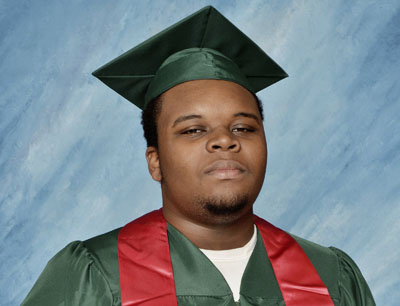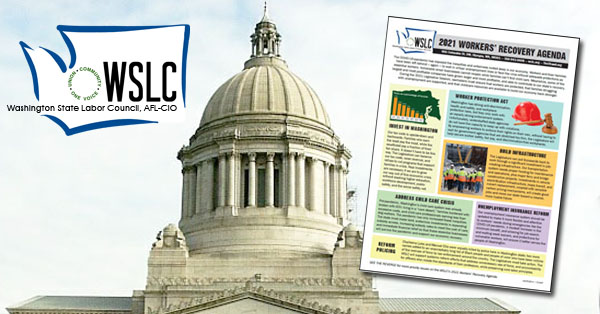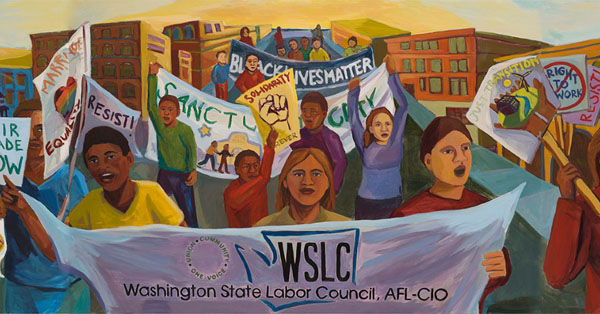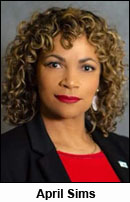OPINION
Confronting racism is organized labor’s work
One year after George Floyd’s murder, we are making progress in Washington state to reshape policing and engage our members on racism
By APRIL SIMS
(May 25, 2021) — George Floyd was lynched one year ago today in Minneapolis. George Floyd should be alive today; instead, his death has defined the past 12 months, as video of his murder sparked world-wide protests and renewed attention on racist policing.
 In the days following, I wrote about the murder of Floyd — a Black father about the age of my husband — and the painful reality of being a Black woman and mother in our country today. I shared my truth and wrote candidly about the fear and pain I feel personally and in my community, the kind of personal narrative that dominant culture pressures us to keep to ourselves.
In the days following, I wrote about the murder of Floyd — a Black father about the age of my husband — and the painful reality of being a Black woman and mother in our country today. I shared my truth and wrote candidly about the fear and pain I feel personally and in my community, the kind of personal narrative that dominant culture pressures us to keep to ourselves.
But this year has taught me that honesty, and the vulnerability truth-telling requires, are how we grow the trust and understanding we need to build together. It’s how we make space for the hard work towards economic and social justice for all workers. It’s how we start to heal.
We spent over a year in a global pandemic — healing has a heightened literal meaning for us all right now. Even for those of us who are vaccinated and looking for some sense of normalcy, we haven’t really reckoned with the impact of the past year’s trauma on ourselves and our communities. We need space for this healing, space for bringing our full and authentic selves to our movement, space for leadership that centers care for one another and for our own well-being.
This isn’t what the dominant culture says is important. Dominant culture teaches us to go it alone, to project strength even when we don’t feel strong, to deprioritize our mental health and well-being. For the dominant culture, leadership is about making the hard decisions solo, throwing our weight around to get what we want, and meeting our goals through force, not coalition-building.
But as a Black woman, my leadership must be more nuanced. As a Black woman leader in Labor, I know I am a bridge between my community and my institution.
Supporting Black women leaders requires recognizing that this linking role Black women play in our movement means we are accountable to more than ourselves and our beliefs. We are accountable to communities and institutions that depend on us to see change in our lifetimes. This is the beauty and burden of leadership. It’s why the support of true allies — accomplices like WSLC President Larry Brown — is so important. Supporting Black women means backing our leadership even when we don’t lead how we’re expected to.
The days surrounding Derek Chauvin’s trial were heavy. I kept coming back to what I know to be true. Chauvin murdered George Floyd. Floyd’s loved ones, Darnella Frazier (the 17-year-old who recorded the video of his murder), and his community have been traumatized. Chauvin is guilty, yes, but the system of policing that enabled Chauvin’s violence — and the violence of so many others — is also guilty. But that system was not on trial and a guilty verdict did not bring justice to our communities. Justice is when the system of racist policing that lead to the conditions for Floyd’s murder is upended. Justice is when Black and brown people stop dying at the hands of a system built on racism. Justice is being able turn on the news without reliving the trauma of another black person murdered by police.
 “Our brother killed our sister’s son.” AFL-CIO President Richard Trumka shared this truth after Derek Wilson, a union police officer, killed Micheal Brown, the son of a union grocery worker. There are no plainer words for the reality organized labor must grapple with.
“Our brother killed our sister’s son.” AFL-CIO President Richard Trumka shared this truth after Derek Wilson, a union police officer, killed Micheal Brown, the son of a union grocery worker. There are no plainer words for the reality organized labor must grapple with.
Organized labor represents workers within a justice system that is killing other working people. Our Black, brown, and Indigenous siblings are living and working under the constant stress of this system. Our movement is uniquely positioned to confront racist policing and work toward a world where all working people can thrive. This is the kind of fight organized labor was built for. This is what solidarity means.
There is immense pressure — the whole weight of the status quo — to take a narrow view of our charge as a movement, to stick to fighting for more hours, more compensation, more jobs, and nothing else.
In a recent town hall, President Trumka addressed the glaring problem with this narrow focus in his classic, plain-spoken style: “It doesn’t matter what you make if you don’t make it home.”
We know it is working people — particularly Black, brown, Indigenous, and poor folks — who are disproportionately and systematically targeted by police, and by the criminal justice system. We know this violence is stopping our fellow working people from making it home. Our charge in organized labor is to fight for the rights and dignity of working people; confronting racism is clearly our work.
We’re committed to the work. We entered the 2021 legislative session with police accountability and reform as central priorities in the WSLC’s legislative agenda. Labor, including affiliated unions that represent law enforcement officers like the International Brotherhood of Teamsters Joint Council 28 and the Washington Federation of State Employees/AFSCME Council 28, backed policies brought forth by impacted communities and grew support for final legislation that Governor Jay Inslee signed into law last week.

This slate of bills is a promising start to a holistic reshaping of policing in Washington, balancing the clear need for accountability from police and oversight of police actions, and the rights of workers that organized labor fights to protect.
1. SB 5051 — A key WSLC legislative priority sponsored by Sen. Jamie Pedersen (D-Seattle), SB 5051 provides greater accountability and transparency in policing by broadening the ability of the state to decertify law enforcement officers that have used excessive force, expanding background checks for law enforcement officers, requiring that complaints against officers be reported to the Criminal Justice Training Commission, and removing confidentiality for complaints, investigations, and disciplinary actions involving officers.
2. SB 5259 — Sponsored by Sen. T’wina Nobles (D-Fircrest), this legislation provides for the creation of a use-of-force data collection system developed jointly by nonprofit and community groups, and law enforcement agencies.
3. HB 1089 — Sponsored by Rep. Bill Ramos (D-Issaquah), HB 1089 requires the State Auditor’s office to review all investigations into use-of-force incidents to ensure rules and policies were followed.
4. SB 5066 — Sponsored by Sen. Manka Dhingra (D-Redmond), this legislation requires an officer who sees another officer engaging or attempting to engage in excessive force against another person to intervene when able, and to report wrongdoing by fellow officers to supervisors. Additionally, officers must render aid to anyone injured by use of force at the earliest safe opportunity. It also prohibits retaliation against officers for following this law.
5. HB 1054 — Sponsored by Rep. Jesse Johnson (D-Federal Way), this legislation prohibits the use of chokeholds and neck restraints by officers, restricts use of tear gas, firing on moving vehicles and vehicular pursuits, and prohibits the use of warrants that do not require officers to announce themselves (known as “no-knock” warrants). It also requires law enforcement agencies to develop policies to ensure officers are reasonably identifiable as they perform their duties.
6. HB 1310 — Also sponsored by Rep. Johnson, HB 1310 establishes a statewide standard for use of force by law enforcement and correctional officers, restricts use of force, and requires police to exhaust deescalation tactics before using force.
7. HB 1267 — Sponsored by Rep. Debra Entenman (D-Kent), this legislation establishes the Office of Independent Investigation within the Governor’s Office to investigate deadly use-of-force incidents involving law enforcement officers.
We’re hopeful this legislation will translate to real change in how policing functions. But we know more work is needed, not only at the policy level, but within our movement.
In the midst of protests last summer — and after the AFL-CIO headquarters were lit on fire by protestors — the AFL-CIO convened a task force designed to interrogate the racism in our movement and recommend change. I am honored to have been appointed to serve on the Racial Justice Task Force representing federated bodies. On May 17, this Task Force released the Public Safety Blueprint for Change, a report from the AFL-CIO Task Force on Racial Justice‘s subcommittee on policing. The Blueprint is written by and for unionized police unions and centered around the Union Law Enforcement Accountability and Duty Standards program, or U-LEADS, which is focused on breaking down the blue wall of silence wherever it exists and holding wrong-doers accountable. There is more work to do, and as we do the work to center equity and reimagine our labor movement, the Task Force will continue to release recommendations.

The WSLC’s Race & Labor training program continues to grow. Since its inception in 2016, more than 1,500 people in our movement have been through the training; participants have brought the lessons learned back to their unions, and in many cases, pushed for their locals and organizations to host further trainings. Through the stewardship and innovation of Kasi Perreira, WSLC Director of Racial & Gender Justice, we’ve scaled up our training capacity to meet the increased demand.
Recognizing the growing demand for these resources, we’ve partnered with local and national organizations to expand the reach of our training program, and build out the slate of trainers. So far, we’ve run trainings in every corner of Washington and in states across the country, from Alaska to Maine. To help scale the work, we’re starting to recruit at least 20 folks interested in becoming Race & Labor trainers from western Washington, and at least 10 folks to do this work in eastern Washington.
Interested in joining a training or becoming a trainer yourself? To get connected to a training near you, fill out this form or contact Kasi Perreria at kperreira@wslc.org.
When I think about the work ahead of us, I come back to this data point from the Economic Policy Institute: this year, working people under the age of 30 are majority BIPOC. Soon this will be the case for all workers. Support for unions is on the rise, and more Americans than ever before believe that racism must be addressed. The demographics and priorities of the working class are shifting, and organized labor must move in tandem with these shifts.
We are sacrificing the future of our movement if we refuse to meaningfully engage in the fight against systemic racism in policing, in our justice system, and in our unions. As a Black woman leader in labor, I choose to engage. I choose to be a bridge between my community and my institution — today and everyday. I choose solidarity. Join me.
 April Sims of Tacoma is Secretary Treasurer of the Washington State Labor Council, AFL-CIO.
April Sims of Tacoma is Secretary Treasurer of the Washington State Labor Council, AFL-CIO.





